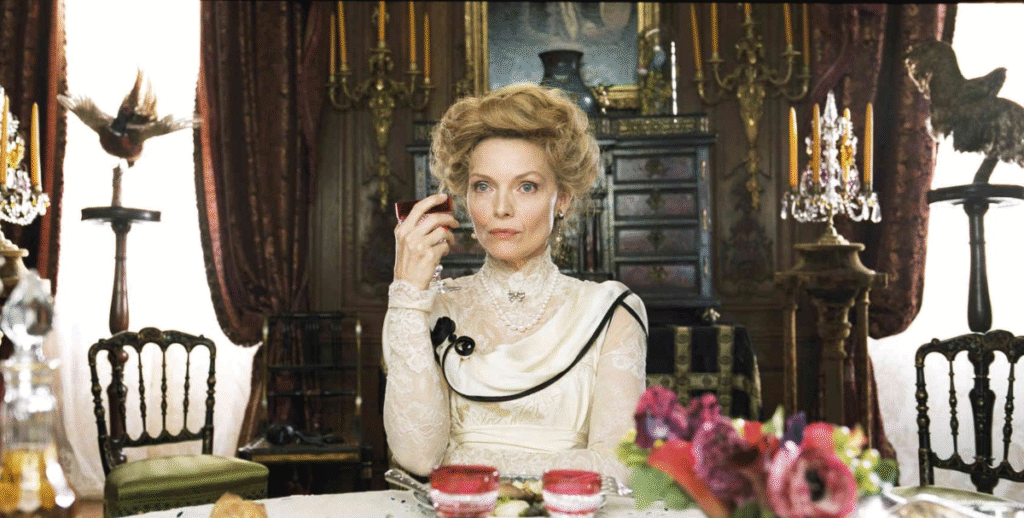Chéri (2009) is a wistful, elegantly crafted meditation on love, time, and the quiet cruelty of social expectations, unfolding like a silk curtain drawn gently over the fading light of Belle Époque Paris. Directed with graceful sensitivity by Stephen Frears and adapted from Colette’s novels, the film explores the intoxicating, ill-fated relationship between Léa de Lonval (Michelle Pfeiffer), a retired courtesan of wit, poise, and melancholy beauty, and Chéri (Rupert Friend), the pampered, emotionally immature son of her former rival, the sharp-tongued Madame Peloux (Kathy Bates).
What begins as a lighthearted liaison, initiated out of convenience and amusement, gradually transforms into a bond that neither Léa nor Chéri is prepared to face—one rooted in affection, shared history, and an aching dependency neither can fully admit. Léa, nearing the end of her reign in a world that reveres beauty and youth, finds in Chéri both a last burst of passion and a tragic reflection of time slipping away. Pfeiffer’s performance is luminous—measured, restrained, and heartbreakingly human. Every glance, every pause, is loaded with years of experience and the subtle terror of becoming invisible. As Léa, she exudes confidence tinged with sorrow, a woman fully aware of the world’s expectations and how little mercy it gives aging women.

Rupert Friend, in turn, plays Chéri as a contradiction—indulgent yet uncertain, seductive but emotionally stunted. His beauty is effortless, but his inner life is clouded by the privileges of being adored without having to earn it. Their dynamic is not about domination or scandal; it is about a slow, almost imperceptible unraveling—a realization that what they share is real, even as life conspires to deny its legitimacy.
The film luxuriates in its setting, with Frears allowing the opulent visual textures—gilded interiors, floral gardens, delicate gowns—to contrast with the emotional austerity underneath. Darius Khondji’s cinematography gives the film a painterly quality, capturing each scene as if preserving a fleeting moment already lost to time. Alexandre Desplat’s score further underscores the film’s tone—gentle, yearning, and filled with unspoken sorrow.
One of Chéri’s most poignant strengths is its refusal to offer easy closure. The voiceover narration (playful yet wise) underscores the irony of a society that elevates love in art but punishes it in practice—especially when it doesn’t fit its prescribed molds. In Léa’s farewell, there is no outburst, no dramatic plea—just the silent grief of a woman who understands that her love is both profound and forbidden by the very world that once celebrated her.

The final scenes resonate with a deep, quiet tragedy. The lovers are not torn apart by betrayal or scandal, but by the slow, suffocating drift of societal duty and personal cowardice. Léa’s heartbreak is unspoken, yet devastating. Chéri’s longing is too little, too late. In this world, love is not a triumph—it’s a private ruin, beautiful and forgotten.
Chéri is not grand or sweeping; it is intimate and unflinching. A story not of youthful romance, but of mature love doomed by the ticking clock and the weight of roles we are told to play. Bittersweet and haunting, it lingers like perfume in an empty room, a love story remembered not for how it began, but for how quietly it was lost.